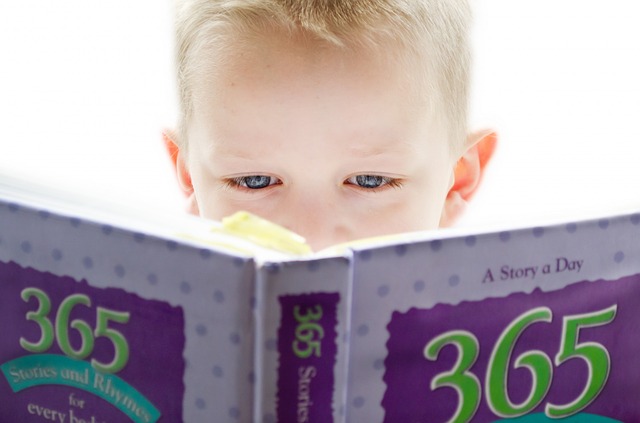
A Successful Holiday Season for the Inflexible Child
December 14, 2016
The Importance of Early Reading Intervention
January 18, 2017





We all make resolutions for the New Year. Sometimes our goals are vague with no end point, so we are set up for failure. Another goal to lose weight this year? We purchase a gym membership, go for a few sessions, and then something comes up in our family. What do we cut?
Sometimes the goal is so vague and so huge that there is little chance you will succeed! We set ourselves up to fail with goals like: Be more organized, Be more patient with the children or family, Lose weight, Take better care of myself, Eat healthier – and the list goes on.
You can start with a vague goal and change it to make it “doable.” A goal to be a better person or be more patient with family members is huge! Think about a small step you can take that can become part of your daily routine. Start small – what about a goal to give each family member a hug every morning before leaving the house? A good hug – give them the kind when you put both arms around them and hold them close for a few seconds. Your family will feel loved and appreciated, and you will feel like a better person.
Another example is to think about what the goal “Get Organized” means to you. Start small. What is bugging you the most? Is it the daily hunt for car keys? Is it the school papers in every room? Is the assortment of shoes or sports equipment all over the house bugging you? Choose one point to work on, and discuss it with everyone involved. You are more likely to be successful in addressing the problem if:
For the problem of sports equipment all over the house, a possible small step is a laundry basket for each youngster in the garage. As the children get out of the car, the equipment, shoes, bag etc. get deposited in the basket. No one walks in the house with these items in their hand. On Friday evening, review the process. How did we do this week? Does a step in the process need to be tweaked? Is there a special treat for everyone because we all worked together this week?

Give the process enough time to become a habit – at least 6 weeks. Then, move to your next item on the “Get Organized” list.
Happy New Year!
Blogger Mary Ann Mulcahey, PhD, shares her expertise in assessment and diagnosis of learning disabilities and ADHD, and the social/emotional adjustment to those issues. If you have questions, please contact Mary Ann at .
Allison Oh
M.A., CCC-SLP
Allison holds a B.A. in Speech-language Pathology from Miami University with a minor in Disability Studies. She earned her M.A. in Communication Sciences and Disorders from the University of Cincinnati. Allison previously completed clinical training in a variety of environments including a Leadership Education in Neurodevelopmental and Related Disabilities (LEND) traineeship through the University of Cincinnati Center for Excellence in Developmental Disabilities (UCCEDD) and Cincinnati Children's Hospital Medical Center (CCHMC). Currently, Allison serves as a speech-language pathologist for Springer School and Center, an evaluator for Springer Diagnostic Center, and a therapist for Springer Learning Center.
In her role, Allison aims to provide therapy that will allow her students to fully engage in the classroom as speakers and listeners. Her objective is to develop a comprehensive understanding of how each student creates meaning from language and how they express intended messages. Beyond the achievement of therapy goals, she strives to help her students become confident, self-advocating communicators through the development of self-awareness and incorporation of personal strategies. Her dynamic approach to assessment is centered around individualization, ensuring each student is provided appropriate accommodations. Allison is dedicated to providing families with insightful information about their child’s communication profile, and meaningful recommendations to assist with communication needs inside and outside of the classroom.
Allison enjoys hobbies like crafting, golfing, and playing the guitar. She is a sports fan and live music/show enthusiast. Allison resides in Cincinnati with her 3-year old dog named Pepper.
Breanna Spears
Administrative Assistant, B.A.
Breanna earned her B.A. in Mass Communications from Savannah State University, where she developed a strong foundation in communication strategy, organizational storytelling, and supporting diverse communities. She brings over seven years of experience in Human Resources and Administrative roles within the finance sector, where she specialized in process development, employee support, workflow improvement, and operational coordination.
Breanna now serves as the Center Administrative Assistant, supporting the Diagnostic Center’s daily operations. In her role, she assists with scheduling, billing, parent communication, and system organization to ensure a smooth and supportive experience for families and staff. Her background in HR and administration helps her create clear structures, anticipate needs, and maintain consistent communication across teams.
Breanna is passionate about building processes that not only work—but make sense. She is deeply committed to bridging the gap between completing tasks and truly understanding the “why” behind them. Her goal is to contribute to an environment where clarity, compassion, and efficiency allow everyone—families, students, and colleagues—to feel informed and supported.
Outside of work, Breanna enjoys gardening, home DIY projects, creating art, and traveling. She resides in Cincinnati with her husband and their two children.
Shelby Chamberlin
Family Outreach Coordinator, M.Ed.
Shelby earned her M.Ed. from the University of Cincinnati in Applied Behavior Analysis. Prior to that, she received her B.A. in Elementary Education with endorsements in Learning and Behavioral Disorders from Morehead State University. Shelby began her career as an intervention specialist teaching students with emotional and behavioral disorders. She continued her professional journey by joining the Springer team in 2021 as a fourth and fifth grade teacher. In her time at Springer she has worked as a classroom teacher, Adventures in Summer Learning teacher, tutor and now as the Family Outreach Coordinator.
As Family Outreach Coordinator Shelby supports families looking for answers in the diagnostic evaluation process, as well as supporting families who may be interested in school year admissions or tutoring, and as director of the Adventures in Summer Learning Program.
Shelby is a passionate sports fan, cheering on the Kentucky Wildcats and Cincinnati Bengals. She also enjoys cooking, hot pilates and being outside with her family. Shelby resides in Northern Kentucky with her spouse and daughter.
Alyson Caldwell
Occupational Therapist, OTR/L
Alyson earned her BS and MS degrees from Eastern Kentucky University. Alyson has prior experience working as an occupational therapist in outpatient pediatrics and skilled nursing rehabilitation before Springer. Alyson now serves as the team lead occupational therapist at Springer School in addition to Springer Diagnostic Center.
As a school-based occupational therapist, Alyson is passionate about helping students develop the skills they need to participate fully and confidently in their learning environments. Alyson specializes in supporting handwriting development and executive functioning, with a focus on helping students become more independent, engaged learners. Alyson believes in meeting each student where they are, building on their strengths, and collaborating with educators and families to develop meaningful and practical goals and strategies that truly support each student’s growth.
Alyson enjoys yoga, being outside with her dogs, antique hunting, and cheering on the Bengals. Alyson is a soon-to-be first time mom and resides in Northern Kentucky with her husband.
Bradley Paramore
School Psychologist, Ed.S, NCSP
Bradley earned his Ed.S and M.Ed. degrees from John Carroll University. Prior to that, he received his B.A. in Psychology and Sociology from Case Western Reserve University. Bradley served as a lead psychologist in public schools for over 10 years. He has previously served as the President of the Ohio School Psychologists Association and held several other leadership positions within the National Association of School Psychologists and Ohio School Psychologists Association. His experiences include serving on various working groups for the Ohio Department of Education & Workforce and the Ohio Department of Public Safety before joining Springer.
Bradley is passionate about providing comprehensive support to families that identifies the root cause of concerns. His goal is to provide evaluations that highlight a student’s strengths as well as proven strategies that can help a student thrive.
Bradley is a passionate sports fan and former college football coach. He enjoys attending comedy shows, live music events, traveling, and listening to podcasts. Bradley resides in Cincinnati with his wife and 2 children.
Ann Kilpatrick
Occupational Therapist, OT/L
Ann earned both her B.A. in International Studies and her M.S. in Occupational Therapy from The Ohio State University. She has prior experience working as an occupational therapist in adult acute care and inpatient rehab. In 2012 she began working as a school-based occupational therapist at Springer School. Ann now works as part of the Springer Diagnostic Center Team.
Ann believes that given the support they need, each student is able to reach their full academic potential. In her role as part of the diagnostic team, she seeks to provide individualized assessment data to identify motor needs and use that data to suggest potential interventions that can be used by families and educators in order to best support the child.
Ann enjoys spending time with her kids, hiking, travelling, yoga, and reading. She lives with her husband, 3 children, and 2 dogs in Cincinnati.
Deborah Gilbert
Clinical Psychologist, Ph.D.
Dr. Gilbert earned her B.A. from the University of Michigan, took a gap year to teach English in Japan and travel through Asia, and then earned a Ph.D. in Clinical Psychology from the University of Detroit Mercy. She also completed a 3-year postdoctoral residency at Chestnut Lodge Hospital, provided therapy and psychological assessments in inpatient and outpatient mental health settings, and served children and families of greater Cincinnati public schools conducting psychological evaluations. Dr. Gilbert is happy to have joined the Springer Diagnostic Center team in 2024.
Dr. Gilbert believes in the potential of young people and works with them to make the world a better place. In the evaluation process, she wants you and your child to feel understood and supported. Dr. Gilbert strives to understand the whole child and build an actionable and evidence-based plan for parents and teachers to support the success of the child.
Dr. Gilbert’s personal passions include her family, traveling, hot yoga, and book club. She and her husband have been married 30 years, have 2 adult daughters, 2 beautiful grandchildren, and a sweet Cavachon dog named Marigold.
Molly Bernosky
School Psychologist, Ed.S., M.Ed.
Molly earned her Ed.S. and M.Ed. degrees from the University of Cincinnati. Prior to that, she received her B.A. in Psychology from the University of Kentucky. Molly has served as the lead school psychologist in public schools, public school administrator overseeing special education teams, and testing psychologist at an ADHD clinic before arriving at Springer. Molly was a founding member of Springer Diagnostic Center and now serves as the Diagnostic Center Director.
Molly is passionate about providing evaluation experiences that feel approachable, collaborative, and strengths-based. Her goal is for families to feel listened to, validated, and supported throughout an evaluation process.
Molly’s hobbies include hiking, listening to podcasts, attending live music and comedy shows, coaching youth sports, and participating in community events. Molly resides with her husband and 2 children in Cincinnati.